17+ Sample Biopsychosocial Assessments
-
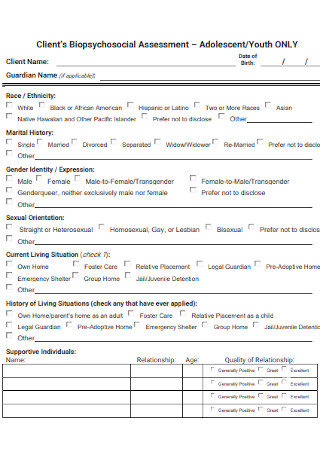
Clients Biopsychosocial Assessment
download now -
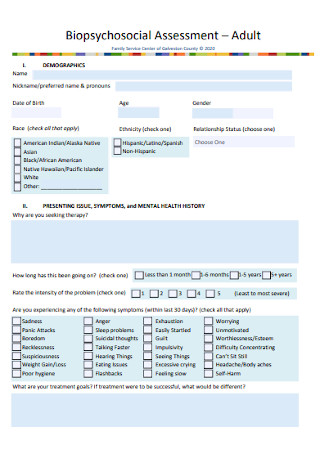
Adult Biopsychosocial Assessment
download now -
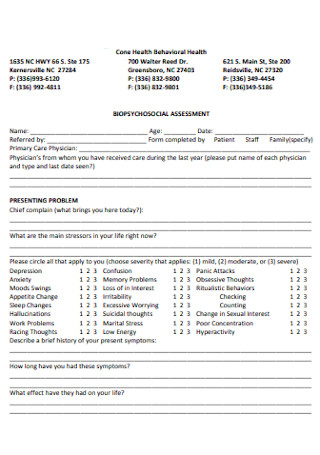
Simple Biopsychosocial Assessment
download now -
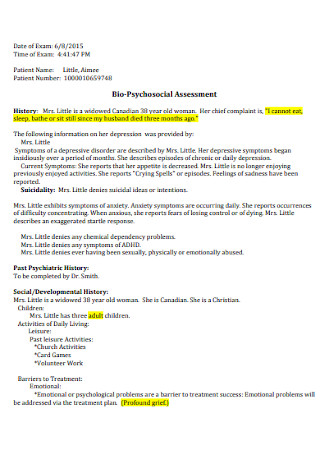
Bio-Psychosocial Assessment Format
download now -
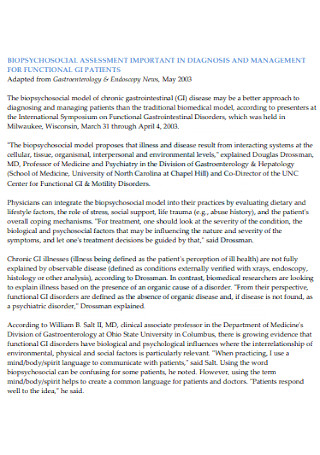
Biopsychosocial Assessment in Diagnosis
download now -
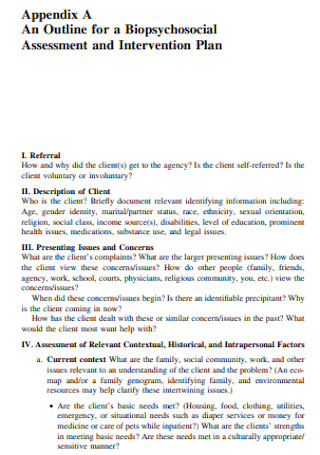
Biopsychosocial Assessment and Intervention Plan
download now -
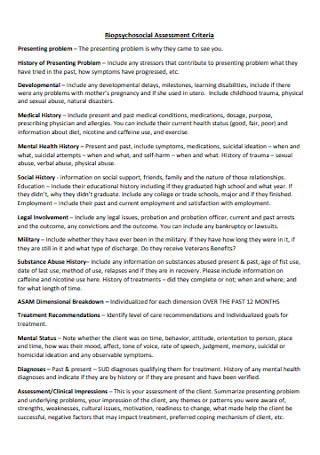
Biopsychosocial Assessment Criteria Template
download now -
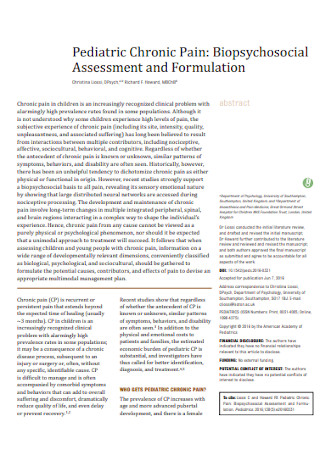
Biopsychosocial Assessment and Formulation
download now -
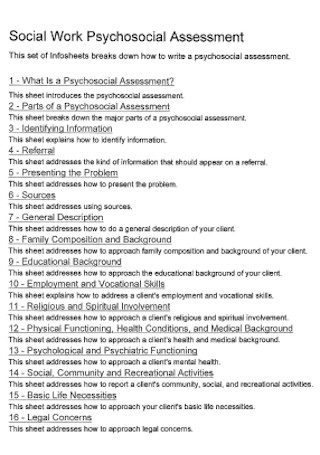
Social Work Psychosocial Assessment
download now -
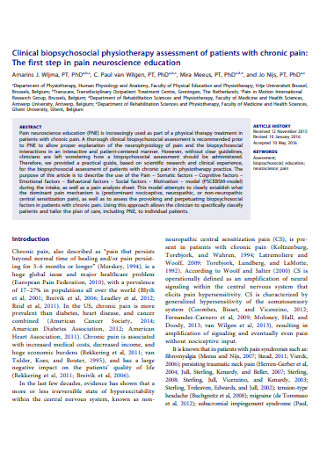
Clinical Biopsychosocial Physiotherapy Assessment
download now -
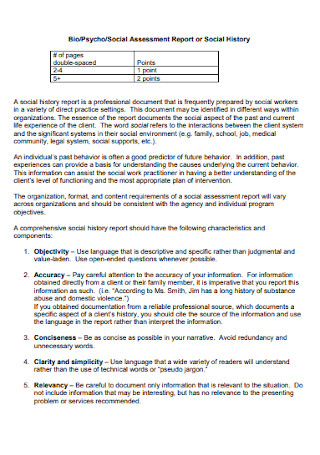
Biopsychosocial Assessment Report
download now -
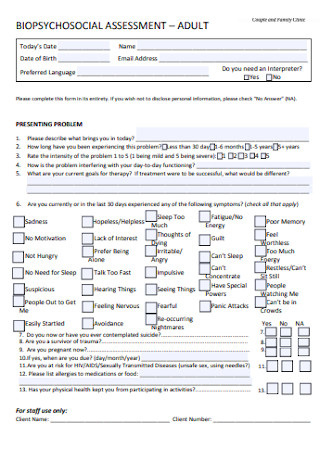
Standard Biopsychosocial Assessment
download now -
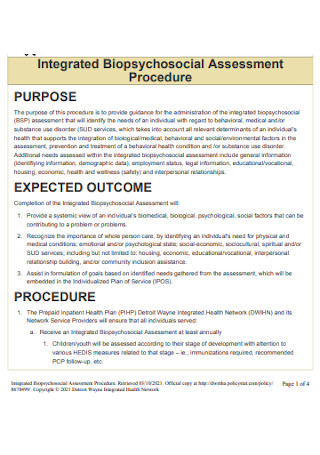
Integrated Biopsychosocial Assessment
download now -
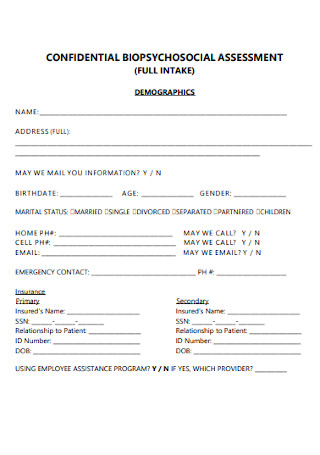
Confidential Biopsychosocial Assessment
download now -
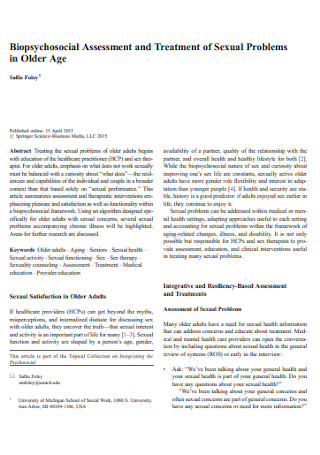
Biopsychosocial Assessment in Older Age
download now -
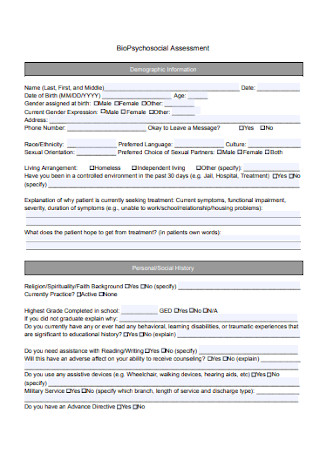
Basic Biopsychosocial Assessment
download now -
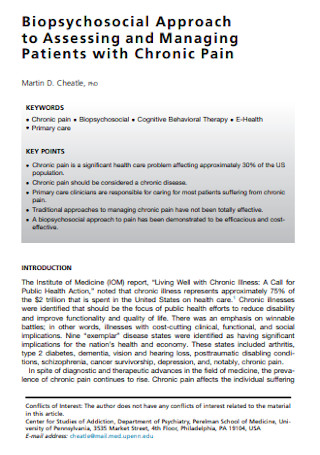
Biopsychosocial Approach to Assessment
download now -

Child Biopsychosocial Assessment
download now
FREE Biopsychosocial Assessment s to Download
17+ Sample Biopsychosocial Assessments
What Is a Biopsychosocial Assessment?
Breakdown of Terms
Uses of a Biopsychosocial Assessment
How to Create a Biopsychosocial Assessment
FAQs
What questions are asked during biopsychosocial assessment?
What are the three components of the biopsychosocial model?
What is a biopsychosocial analysis?
What Is a Biopsychosocial Assessment?
A biopsychosocial assessment is a written evaluation of a client or patient by a trained professional. The assessment is based around the context of the former’s biological, psychological, and social circumstances.
According to a study done by the Center for Disease Control and Prevention, 19.2% of adults in the United States received some form of mental health treatment in the past 12 months, as of 2019. Some 9.5% received professional counseling and therapy while 15.8% took prescription drugs for their mental health.
Breakdown of Terms
In order to understand the proper method of assessment, it is important to first unpack the three concepts that make up the assessment form based on Engel’s model.
Biological Factors
When it comes to the biological aspect of the biopsychosocial model, this mostly pertains to the physical health reports of the patient or client. A patient may seek treatment for depression or anxiety, and scientific studies have shown that there is a biological link involved that could be a contributory factor in the disorder or illness. Doctors and health professionals see the link between genetics, chemical imbalance and mental illness. In a lot of cases, mental disorders are hereditary wherein the likelihood of developing an illness is higher in people who have family members who suffer the same condition. Which is why psychiatrists often prescribe medication- such as antidepressants- to patients as part of their treatment. In addition to therapy and counseling, medication can help regulate and help the patient deal with his or her disorder. In the case of substance addiction, it is widely considered a disease and requires similar treatment as well. Extensive studies show that the brain is debilitatingly affected by prolonged substance abuse. It is a known fact that long term drug use and drug dependency may cause serious physical and mental deterioration or psychological damage.
Psychological Factors
Apart from the biological, the psychological aspect is a key area as well. When people speak of psychology, it is often associated with the mind and cognitive behavior. All individuals have minds that drive their thought patterns, beliefs, disposition and even personality. When a person or client is undergoing therapy or counseling, there is a lot of personal analysis and introspection involved. A psychiatrist or mental health professional will often need to scratch beyond the surface to get to the bottom of any underlying condition, unresolved trauma, or personal issues. Psychological factors usually involve coping skills, individual perception, emotional and mental well-being, and even the idea of self-worth or self-esteem. In the process, a therapist may look into the person’s different coping skills and defense mechanisms. Traits like resilience and emotional maturity are highly regarded and typically seen as a good counter measure in dealing with stress. With that being said, stress is another key factor in psychological assessment. How well an individual deals with and self-regulates internal or external stress is vital to the discussion.
Social Factors
As far as social circumstances are concerned, it usually means placing the individual in the context of his or her own immediate environment. This pertains to the patient’s family life, peer relationships, upbringing, school or work environment, community life, and their socio-economic status. If the biological focuses on the natural and physical aspect of an individual, the social assesses the external environment he or she was brought up and shaped by. Therapists and licensed counselors will try to paint a picture of the type of upbringing and how this influenced the individual’s current state and disposition. How healthy were the client’s primary relationships? These could be their relationships with parents, siblings, grandparents, spouse, children, close peers, etc. What type of home did the patient grow up in? Was it a healthy and supportive household or a neglectful and abusive one? Does the patient come from or reside in a low-income or privileged area? What kind of neighborhood does he or she live in? And growing up, was there a prominent supportive community or was there a lack of it? These are the types of questions that social factors play in a biopsychosocial assessment.
Uses of a Biopsychosocial Assessment
Why do people feel the need to take a biopsychosocial assessment? Other times, patients do not even have a choice because they are forced by other people or by unfortunate circumstances to seek help. For those individuals who voluntarily undergo a biopsychosocial assessment, most of the time it is to address a problem or resolve an issue. The following examples are some standard uses of a biopsychosocial assessment:
How to Create a Biopsychosocial Assessment
Typically, social workers and mental health professionals are the only ones who are in the position to conduct biopsychosocial assessments. It takes a great deal of training and experience when dealing with people’s mental and emotional well-being. There are several editable templates above that are designed for custom use. Once you’ve picked the right one for you, simply follow the guided step-by-step process below.
Step 1: General Information
All assessment forms need to establish the basic information before proceeding with any measure of evaluation. This includes the patient’s name, sex, date of birth, marital status, contact details, medical history, reason for the assessment or referral, emergency contact, and other relevant information. Also, most assessment forms include a confidentiality clause or a non-disclosure agreement. This protects the patient and their right to privacy.
Step 2: Proper Format
A biopsychosocial assessment form may vary in format, depending on the institution or organization. But more commonly, a questionnaire or survey-type form is used. Before inputting any questions or rubric in the assessment form, you would need to decide on a uniformed and standard format first. Keep in mind that layout still matters. Do not get too wrapped up in the evaluation questions that you neglect the proper spacing and margins.
Step 3: Evaluation Questions
The meat of any biopsychosocial assessment form comprises of the questions itself and the assessment criteria. These are then divided into three areas: biological, psychological, and social. It is important for mental health workers to draw up objective and bias-free questions that are based on clinical judgement and ethical standards; because asking the right questions can lead to a better and more comprehensive assessment of the patient.
Step 4: Data Interpretation
When a patient sees a professional for a biopsychosocial assessment, they are then observed for a period of time and asked a series of questions. It is up to the mental health professional to interpret the data and observations gained from the session or interview. A professional health setting requires a standard and scientific way of interpreting data. It is always based on objective and accepted medical theory. If you are the assessor, you would need prior training and expertise in order to make a sound clinic evaluation.
FAQs
What questions are asked during biopsychosocial assessment?
There can be a variety of questions asked during a biopsychosocial assessment. These pertain to the patient’s biological, psychological and social backgrounds. For example, a patient may be asked about his medical history, particularly history of substance abuse; the state of his personal relationships; his work environment and feelings towards his job; his childhood and family history; and how he handles stress or adapts to change. Biopsychosocial evaluations need to be comprehensive and detailed for the assessor to truly capture a patient’s overall state.
What are the three components of the biopsychosocial model?
The three components of a biopsychosocial assessment are the biological, psychological, and social circumstances that surround an individual’s life. This tripartite approach was a model developed by American psychiatrist George L. Engel.
What is a biopsychosocial analysis?
A biopsychosocial analysis is a three-way method of approaching a person or patient’s state of mind and behavior. The analysis can be a helpful tool in determining the root causes or probable effects of an individual’s illness. It borrows concepts and ideas from the fields of biology, psychology, and social structures to try to explain and assess an individual’s behavior.
All three branches of the biopsychosocial model are uniquely important and contribute a great deal in the study of human behavior. Perhaps the most significant benefit of using this approach is it allows a multi-dimensional view of a person or phenomenon. It is not restricted to merely one perspective. Thus, it’s imperative your biopsychosocial assessment form should be able to reflect this notion in both your questions and interpretations. Use the sample assessments above as a guide to get started today!
